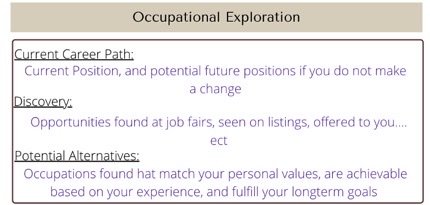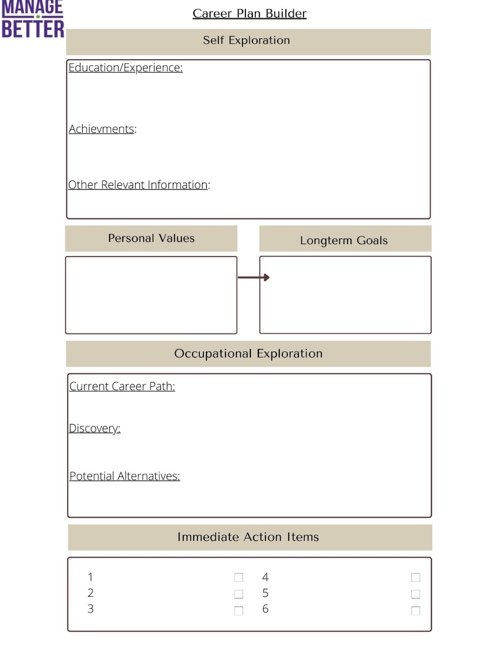The 5 Essential Career Building Steps
Optimize team management in minutes with ManageBetter. Start your free trial now and join Uber and Microsoft in boosting performance, gathering insights, and generating reviews—all AI-powered, no writing required.
Introduction
Career planning is the continuous process of examining yourself, your values, and the opportunities surrounding you to align your present goals with your future plans. Career planning is more than just focusing on the job you want; it’s about preparing for a future and life you are proud to lead. Career planning has three main components: self-exploration, occupational exploration, and goal setting.
Why Career Plan?
Career planning ensures you have the space, the experiences, and the education you need to achieve your professional goals. The biggest takeaway from career planning is the alignment of your goals and wishes with your opportunities. Although many see career planning as just an attempt to plan out future occupations, it is much more. Planning one’s future can reveal a lot about who you are and what goals are most important to you. Career planning should be done by everyone, not just those who are young and ambitious, as the benefits are more than just the creation of a finite plan.
The following are the critical career planning steps:
(Attached at the end of this post is a blank Career Planning Outline made by our team here at ManageBetter to help you organize your thinking.)
Step 1: Self Exploration
This is, in many ways, the most important part of career planning. Career planning is very much a means of finding yourself. When going through the process of exploring oneself, determine what you really want and value from your professional career and what will fulfill your personal aspirations. Self-exploration is the process of examining your skills, experience, interests, and education. You should reflect on the knowledge you have already accumulated. Following this, compare that to the experience you would like to have or need to achieve your goals and consider finite steps that will take you there. It is helpful to write down and assess your achievements, education, work experience, and other relevant information.
Step 2: Asses Values and Create Goals
Once you have reviewed your personal experience, you must consider some values that will guide your career plan. These values can be more ambiguous such as “healthy work-life balance,” or they can be more concrete, for example: “debt free in ten years,” “manager in five years,” or something as simple as “getting a promotion.” As long as they are important to you, they will be effective. These values will become your long-term career goals as you formulate the rest of the plan. They are the main objectives you will search for as you look at new career opportunities.
Step 3: Occupational Exploration
Occupational exploration is the next step in formulating a career plan. Occupational exploration is meant to broaden one’s understanding of the job market surrounding them and create a space for new occupations that one had not considered before. Take the values you determined in step 2 and assess what opportunities will make them accessible. One should research job profiles, conduct informal interviews, attend career fairs, and gather labor market information when undergoing occupational exploration. Often there is a relatively narrow-minded idea of different careers (teacher, police officer, banker, doctor, etc.). However, deeper exploration can open many opportunities that may not have been familiar before. Occupational exploration can reinforce your current career path, or it can lead to a transition to a new career or occupation. Regardless, career exploration should always follow your personal goals and passions. You should choose your career and not feel forced into staying where you are.
Step 4: Creating Action items
Build an action plan with incremental steps that will lead you to your career goals. Think about what might stop you from achieving your goals and create contingency plans for them. Look around you for people who have taken the steps you wish to take and learn from them. This step requires you to make decisions about what it is you value. It is important to synthesize all the information you have gathered through personal and occupational exploration and determine your goals and the immediate steps you need to take. To attain the career they want, many people may have to achieve some form of higher education. Many career plans cannot begin without educational planning. Whatever your first step is toward your career goals, take it, but know that just because you made one plan does not mean things can not change in the future.
Step 5: Update your Plan as you Grow
As you grow older and experience new things, your career plan can change along with you. Not everyone still wants to be the astronaut they once dreamed of. This is okay. Your career plan should support you, not restrict you. If you feel your original plan was insufficient or did not suit your current personal aspirations, then take a few steps back and create a new plan. Rethink your present and past goals, see where they differentiate, and assess the potential for a shift in your career plan.
Sharpen Your Leadership Edge: Join 3,000+ executives receiving weekly, actionable insights from industry experts. Subscribe free to The Thoughtful Leader and elevate your team's performance.






